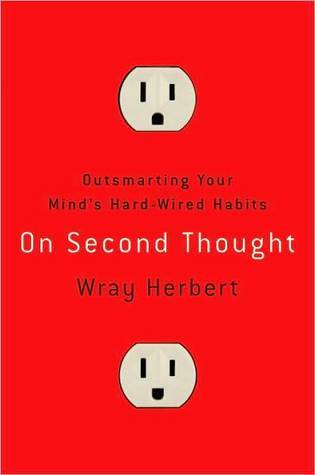Wray Herbert, author of On Second Thought: Outsmarting Your Mind’s Hard-Wired Habits, has an interesting explanation why even though “study after study has shown that parents, compared to adults without kids experience lower emotional well-being, have unhappier marriages and suffer more from depression, that they insist that..a life without children is a life unfulfilled.” The phenom at work?
It boils down to a psychological phenomenon called “cognitive dissonance.” Defined, it is a psychological defense we create to justify our choices and beliefs. In the case of parenthood, it can explain why parents create the “myth of parental joy because otherwise <they> would have a hard time justifying the huge investment that kids require” (and all the other negatives).
Research exploring the role of self-justification in parent beliefs supports the idea that cognitive dissonance is at play. For example, an article in Psychological Science, talks about a study that looked at how the high costs of kids and parents’ predictions of leisure time with them.
When parents have the high costs of children in mind they were much more likely to say that they enjoyed spending time with their children, and they also anticipated spending more leisure time with their kids. As Herbert says, “In other words, being aware of parenthood’s price tag made them idealize the time they spent with their kids, and this idealized image of family life led them to foresee more shared time in the future.”
Beyond parenthood, we all use cognitive dissonance as a way to justify our choices and feel good about them after the fact. It shows up in irreversible choices like parenthood, but also in much more simple situations. For example, after we buy that new whatever the car is, we tend to start seeing that car everywhere, and like that car even more.
But back to the kid thing—I have been pondering, how is cognitive dissonance at work with the childfree? Unlike parents, we have not made a choice we can’t take back that we might secretly regret and then have to idealize it to justify that choice.
But we have made a choice that if cognitive dissonance is at work, after we made it, we will find ways to confirm its “rightness.” This could include focusing on all the positives that go along with a life with no kids, and not the negatives or the positives that can come along with parenthood.
In my case, I more easily focus on all the things I love about being childfree, which looking through a cognitive dissonance lens, makes it easier to not slip into that tiny slice of me that sees her mom friends have this amazing emotional connectedness with their kids, which I have thought could be very cool. Then I snap out of it (it could be cool but not That cool), and once again revel in the joy of the freedoms that a childfree life gives me.
Going further, though I wonder if the ranting and “breeder bashing” out there is another form of self-justification, which of course can come from both directions, parents and not. I also wonder if those who are deep down not settled in their own mind and heart (whether conscious or not) about not having kids are the ones to have to do the most criticizing of parents or justifying of the choice not to have them…
How do you see cognitive dissonance working with the childfree, or in other areas of your life for that matter?






“I also wonder if those who are deep down not settled in their own mind and heart (whether conscious or not) about not having kids are the ones to have to do the most criticizing of parents or justifying of the choice not to have them… ”
You’ve hit the nail on the head here.
People who feel the need to push others into their version of the “good” life (whatever that may be) aren’t secure in their choices or self yet.
The more I think about it it might just be that cognitive dissonance can operate when people are ultimately still holding the two options (no kids and kids), and having made the choice for one, but not completely resolved about not having made the other choice…
I agree with Lydia, people who are really secure in their choices aren’t bothered by the choices of others. However, I think it’s just human nature to look at someone else’s life, compare it to your own and either feel validated in your own choices or feel that maybe you should have made a different choice. What matters the most is how you feel the majority of the time; personally, I quite often feel validated in my choice to not have kids, but I’ve never really felt envious of a parent, curious, but not envious. Even when observing the “joys” of parenthood, it’s not something I want to experience. I suppose that feeling confirms the “rightness” of my choice because the other choice just feels very wrong.
That makes sense, Laura. There are certain choices that I have made that I have never questioned, I don’t feel the need to validate them at all and I don’t even revisit the other options I had at the time I made my decision. Being that sure of a choice doesn’t require any validation. On the other hand, there are some choices I wasn’t as sure of, even made long ago, that I still feel the need to validate. I think the decision not to have kids probably requires validation (even if you are sure you don’t want them, as I am) because it seems that EVERYONE has or wants them. (Being in the minority makes us more doubtful than if we were in the majority. Parents are constantly being validated in their choice, they are doing what everyone else is doing.) As I get older, I don’t seem to need validation like I did when I was younger, this choice has been resolved for me.
Although I do have a child, I often think back to a point a therapist made to me after I had made the decision to only have one child (and not more). Whatever decision we make (have a child, don’t have a child or have only one child, don’t have more children), even if we feel comfortable with that decision and feel, overall, it is the best decision, it is natural to feel some sense of loss for the decision we didn’t make and sometimes the best we can do is acknowledge that loss. Although I felt, overall, our decision to just have one was the right one, there was still that lingering feeling of what if…once I sat with the feeling as it was, a small part of me mourning not to make that other choice, and just accepted it, I found that I no longer had any doubts at all. I think cognitive dissonance can arise when we don’t allow ourselves to acknowledge our doubts or feelings of ambiguity, and we end up needing to hold too tightly to our “right” decision (and come up with all kinds of justifications)–rather than just accepting it as one path we chose, with all its ambiguities.
Nicole, I like your thinking on cog diss–not acknowledging doubts etc can make a person have to be “right” and convince others s/e is right, when what they can really be doing is re-validating their own decision to themselves~L
My husband and I re-validate our childfreedom every day, from ‘Thank God we don’t have to drive a mini-van’ to ‘Isn’t it wonderful the house is so quiet with no screaming kids’. Is this evidence of cognitive dissonance? I don’t know. There’s a big difference IMO between the cognitive dissonance of the childfree and that of parents. The childfree can change their mind and have children (at least up to a certain age) or adopt, whereas a parent is more or less stuck, unless they want to abandon their children and be ostracised from society and/or put in jail.